THE YOUNG & THE RESTLESS Headwriter Josh Griffith Shares His Vision for the Soap’s Future (EXCLUSIVE)
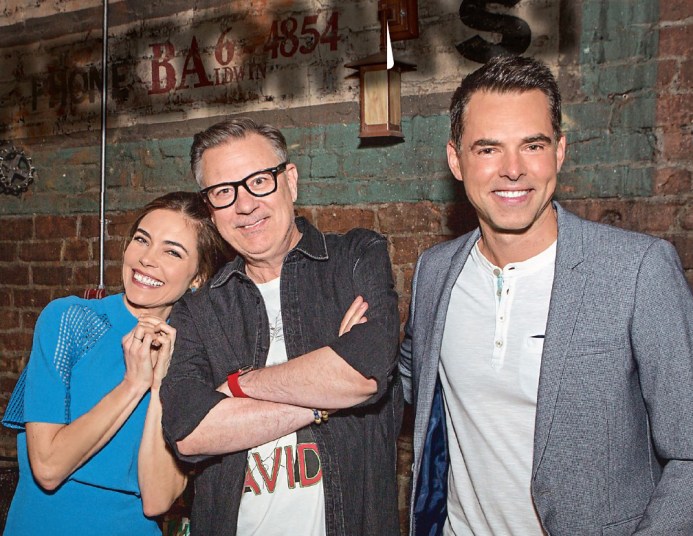
This past January, Josh Griffith once again returned to THE YOUNG & THE RESTLESS as co-executive producer/headwriter, taking on the awesome responsibility of steering the 46-year-old sudser into the future. Soaps In Depth spoke with the scribe about his latest journey, and maybe what we can expect to happen in Genoa City.
Soaps In Depth: What’s the biggest challenge to stepping into a head writer position?
Josh Griffith: Well, it depends. If it’s a show that you’ve never done before, you have to learn the voice of the show, the characters, the identity of the show. But if it’s like here, where I am coming back to a show that I’ve done before, it’s really just making sure that you can smoothly transition from the previous headwriter’s stories into what you want to do without making the audience feel like you’ve switched from English to Japanese.
In Depth: While critics say all soaps are the same, true fans of the genre know that’s not true. What are the characteristics which make Y&R different from other soaps?
Griffith: I think simply put, it’s the characters on the canvas that make each show unique, and I think it makes Y&R especially unique because we have so many characters that have been on for such a long time. They are what mark the identity of the show. It’s their appearance, their vision, their wants, their desires, their interactions. Just like any town, when you look at it from an airplane, they all look the same. But when you get down into the town, Milwaukee is nothing like Boston, and L.A. is nothing like New York. So Genoa City is not like [ONE LIFE TO LIVE’s] Llanview or [THE BOLD & THE BEAUTIFUL’s] Los Angeles or [DAYS OF OUR LIVES’] Salem. So it’s the town, it’s the people, it’s the world that they live in and how they interact that makes the show unique. As a writer, you tap into that. You should always be saying, who are these people and what do they want?
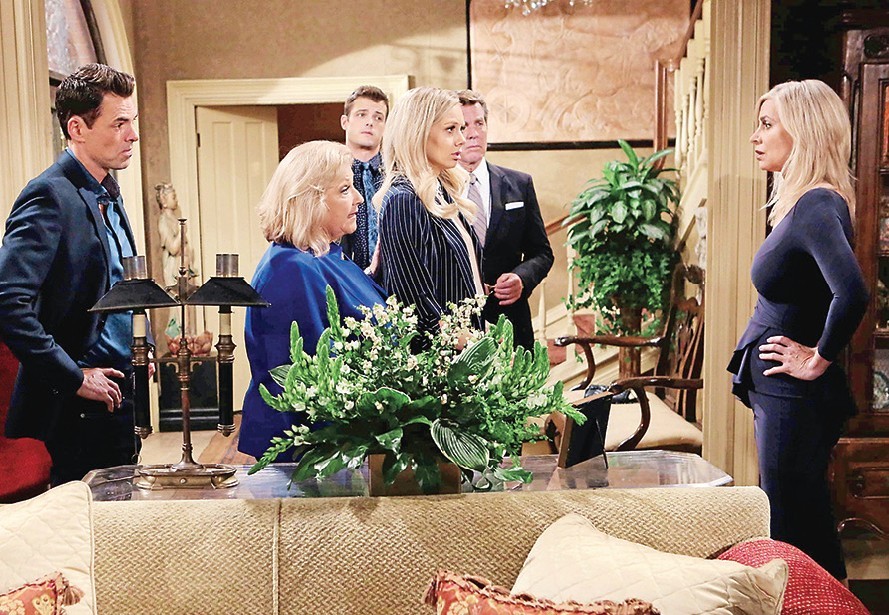
Business storylines, in Griffith’s mind, are really all about two things: power and family. (Photo Credit: Howard Wise/jpistudios.com)
In Depth: Is there a specific type of story that works better — or doesn’t work at all — on this particular soap?
Griffith: Well, you should never do aliens! Y&R is one of the few shows that has always been able to do business because it’s always been a clash-of-the-titans kind of show. I think the reason that Y&R has always been successful at business is because it’s not viewing it as a story about business but a story about power. And when you are telling a story about power, then it’s dramatic and interesting and relatable. It’s not about selling stocks, it’s about taking someone else’s possessions.
In Depth: It’s about family dynasties.
Griffith: Yes. Dynasty is a good word. Family dynasty, especially on this show — we’ve got the Newmans, the Abbotts, the Chancellors, the Hamilton-Winters [family]. It’s huge and deep-rooted!
In Depth: What do you think is your strength as a head writer?
Griffith: I think I’m pretty good at easily getting inside the characters’ heads, knowing what they want and allowing that to drive my story as opposed to imposing plot onto a set of characters. My story comes out of getting inside their heads and asking the question: What do they want? What’s in their way? And that spins out into story.
In Depth: Are there any particular challenges that you think are unique to being a head writer?
Griffith: Because I love all the characters so much, finding a way to give them an opportunity to tell their story in such a truncated amount of time weekly and daily. The great thing is, five days a week is a lot better than one day a week in primetime. So you have that luxury. But you have a short amount of time in each of those days, and we have a bigger canvas than most shows in other day parts. So it’s allowing all of them to be able to tell their story.
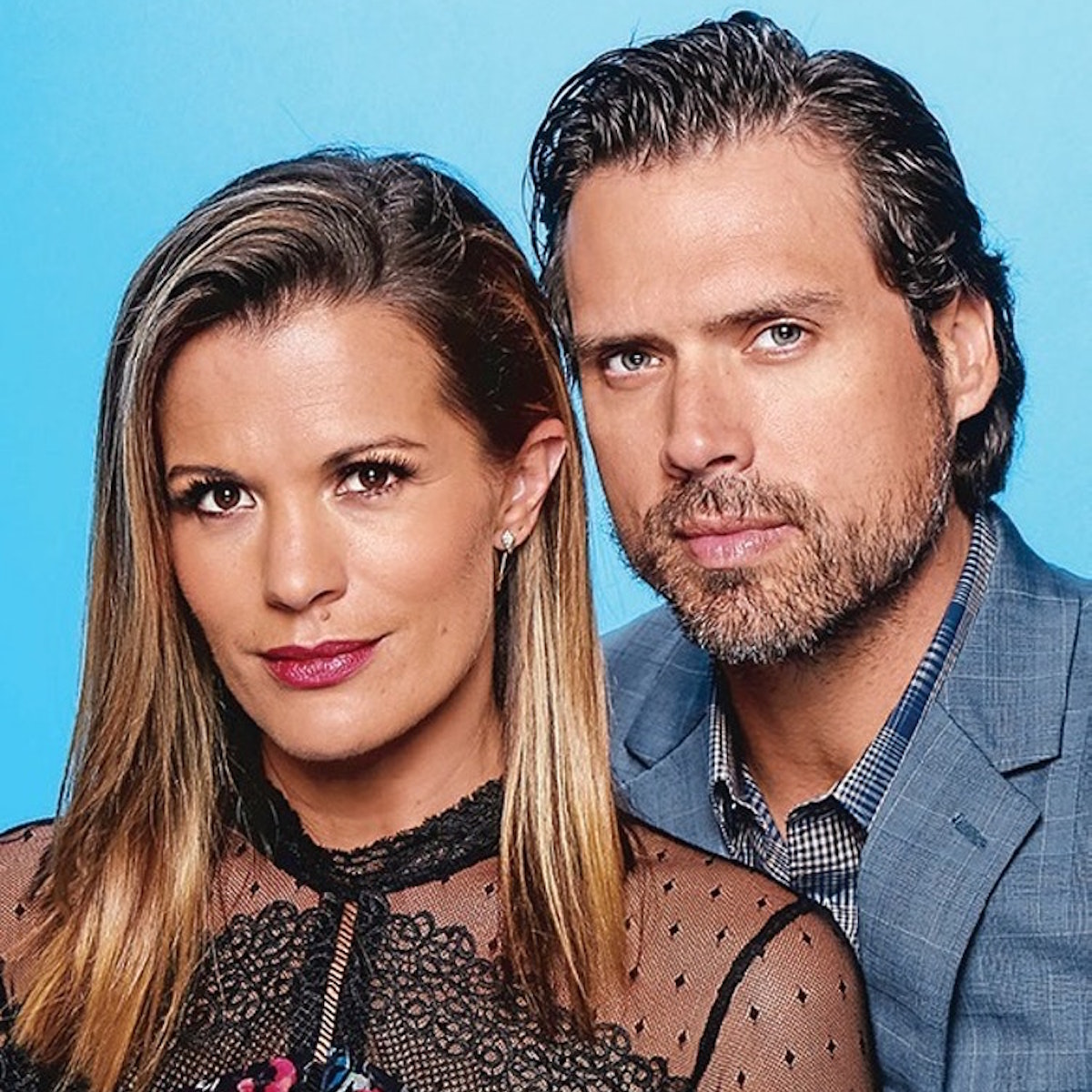
One of Griffith’s first orders of business was bringing back fan faves like Nick’s ex, Chelsea. (Photo Credit: Howard Wise/jpistudios.com)
In Depth: What’s the very first soap scene you ever remember watching? Were you an instant soap fan, or did it take time to catch the fever?
Griffith: As a kid, I was obsessed with the original DARK SHADOWS. I would race home from school to get home in time to watch the four-o’clock broadcast of DARK SHADOWS. I didn’t think of it as a soap. I just thought of it as this great show about vampires and werewolves in the afternoon. As a child, the only other image I have of soaps was the opening sequence of THE EDGE OF NIGHT, which was that apartment building and pressing in on that one window as daylight went to night. I just remember that being such a fantastic image. But that was pretty much it for me for soaps as a kid. I didn’t really fall in love with soaps until I was in my mid-20s, and I watched SANTA BARBARA for the first time and just went, ‘Wow! This show has amazing characters, it’s so well written — I love it! I’m going to write for that show!’ I knew that within a week. I watched a week of it, but I was hooked the first day. This was around 1987. I said to myself, ‘I am going to write for this show.’ Later, I found out that my dad was dating a scriptwriter on the show! So I got to know her — Lynda Myles — and she sort of mentored me with the scripts that I was writing as samples on my own — not assigned to me by the show. I would watch Monday [through] Friday, and then I would write what I thought the Monday show was going to be… I would give it to Lynda, and she would critique it, and that’s sort of my first real, serious entry into the soap world. And I ended up getting a job on the show!
In Depth: If you could say something to lapsed viewers in an effort to get them to come back, what would it be?
Griffith: I would say, ‘If you went away because you no longer felt like it looked like your show, one of the crucial things that Tony [executive producer Anthony Morina] and I discussed when talking with the network when we took over in January was that we really wanted to take the show back to its iconic core sensibility. One of the reasons we brought Michelle [Stafford] back as Phyllis and we got [Melissa Claire Egan] back as Chelsea, and we’ve got Greg [Rikaart] back as Kevin, and other surprises coming in the future is that we really wanted to get the show back to that identity that people so love about it. So I would say to them, ‘What you loved is there. Come back, and we’ll show you! We’ll hook you. Just give it a try!’
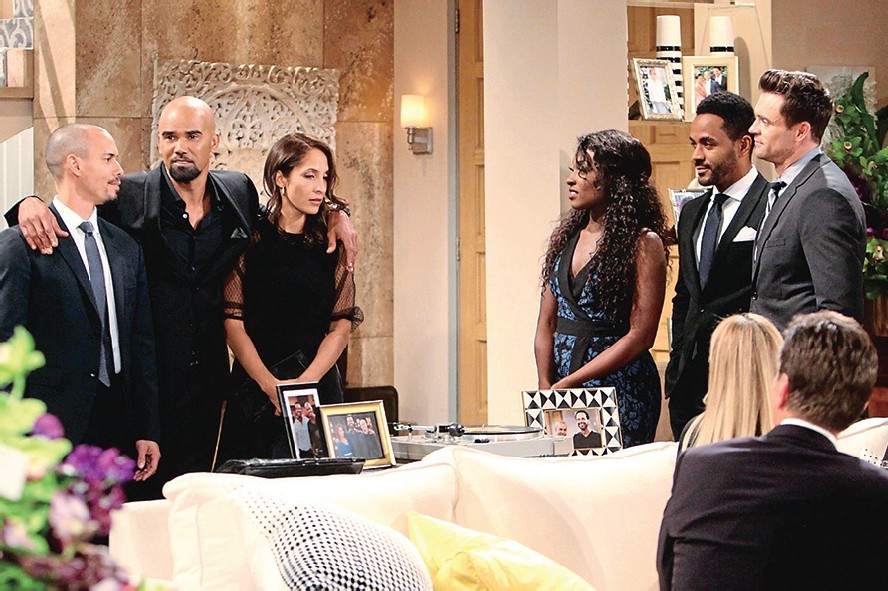
Key to the scribe’s handling of the passing of Neil and his portrayer was honesty. (Photo Credit: Howard Wise/spistudios.com)
In Depth: One of the challenges that you immediately faced was dealing with Kristoff St. John’s passing and finding a way to write Neil off the canvas. How did you approach that?
Griffith: It was very difficult. Kristoff was a friend of mine. I loved him dearly. It was such a blow. Reacting to that and taking it in was incredibly difficult, painful and emotional. But at the same time, I knew we couldn’t wait too long to address it, and I knew that Kristoff would not want us to wait too long. Kristoff would have wanted us to make as much drama of this for the show, which he loved so much, as we could. That said, we wanted to be very careful that we never exploited it, or made it gratuitous or dramatic just for shake-up’s sake. We had to approach it honestly, simply. That’s why it wasn’t a plane crash, it wasn’t a car crash… it was just Neil very simply had a stroke and died in bed. What mattered most was how we could have that reverberate through the town, through our characters in the most honest and simple way possible. And once we looked at it that way, the shows fell into place. Here’s what would happen, and here’s how everyone would react to it. The actors were just stunning in how they portrayed it.
In Depth: They say you don’t fix what’s not broken, and viewers know that goes for soaps, too. With that in mind, what do you see as needing, if not fixing, tinkering?
Griffith: It really depends. Like I said, I come in and look at the canvas, and I say, ‘Who hasn’t had much story? And why is that?’ Maybe it’s because they haven’t been interacting with the people they should be interacting with. So it’s never fixing or tinkering, it’s always just looking at the canvas and saying, ‘Where are these people going? And who are they going to relate to to get what they want?’ It always comes back to that question — what do the characters want? It’s like an acting exercise. What do I want in the scene? What do they want in their lives? And then you grow the story from there. It’s never a matter of fixing for me, it’s just the organic moving in a certain direction that maybe is a different direction than it was going in before, the direction that [the characters] are telling me that the show should go in. I literally have… every show that I’ve ever done, I get every cast member’s headshot and put it up on my wall, and sometimes spend an hour just sitting in my chair, staring at them, going, ‘Okay, talk to me!’
In Depth: A year from now, when people are looking back at the first 12 months of your tenure at Y&R, what do you hope they’ll say?
Griffith: That this is a show that touches my heart, and I love spending five days a week in this world.
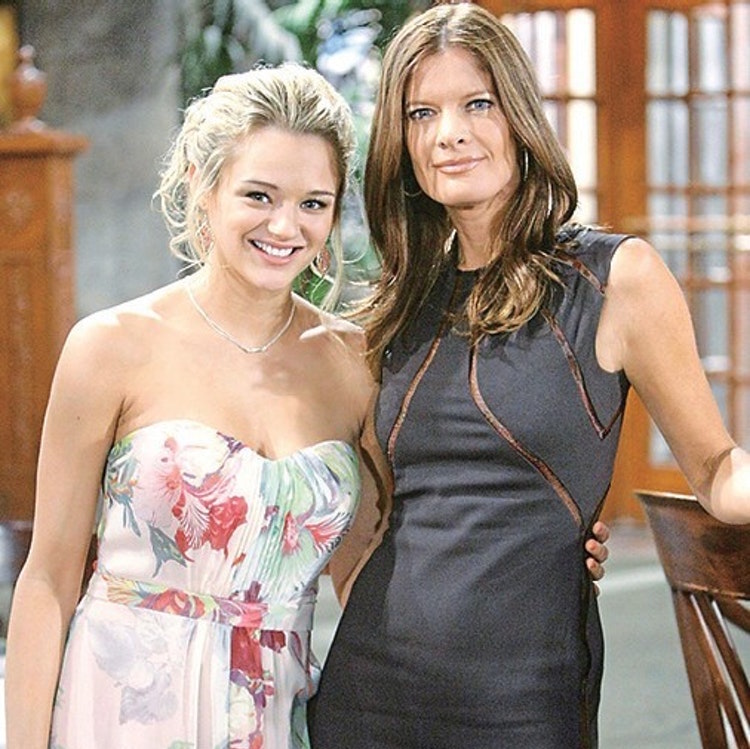
Griffith hopes that familiar faces like Stafford’s will draw back in lapsed viewers. (Photo Credit: Sean Smith/jpistudios.com)
In Depth: When you step away from Genoa City for a little free time, what kind of stories do you enjoy, whether on the big or small screen, or maybe reading-wise?
Griffith: I love passionately to read mysteries. I love the mystery of it! The puzzle. This happens and then this happens, which is leading to solving a mystery. It is to me just fantastic!
In Depth: Have you ever seen a story on another show and thought, ‘Gee, I wish I’d written that!’ whether because it looked like something fun to explore or perhaps because you would have taken it in a different direction?
Griffith: Not really ‘I wish I’d done that,’ but more, ‘Wow, they did a great job with that! That was terrific!’ When I watch other things, I try not to go into it as a writer. Sometimes it’s hard to leave that behind, but I try to so that I am just viewing as a viewer, a watcher, a spectator, so I get caught up in the story without having my writer brain go, ‘Oh, I don’t know why they did it that way’ or ‘They should have done it this way’ or ‘I know where this is going.’ I like to fall into the fiction and let it carry me as nothing else but a viewer.
In Depth: Final question — the late Harding Lemay wrote an amazing book about his headwriting experiences, Eight Years In Another World. If you were going to write about your time writing for daytime, what would you call the resulting book?
Griffith: A Curve In The Road, because (a) it was the name I gave the story of Delia’s death by Adam’s hit-and-run, possibly the most successful one I’ve written, and (b) my daytime career has, in many ways, been a journey along a road with many curves and surprises around each one.
For more Y&R news and features, keep reading the CBS edition of Soaps In Depth magazine.
This story originally appeared in our print magazine
More From CBS Soaps In Depth
Elizabeth Hendrickson Married Rob Meder — See the Gorgeous Wedding Photos!
Y&R Stars Remember the Late Kristoff St. John on His Birthday
The Truth About Victor’s PNH Blood Disease
Amelia Heinle and Her Sister Had the Best Vacation in Paris — See the Pics!











